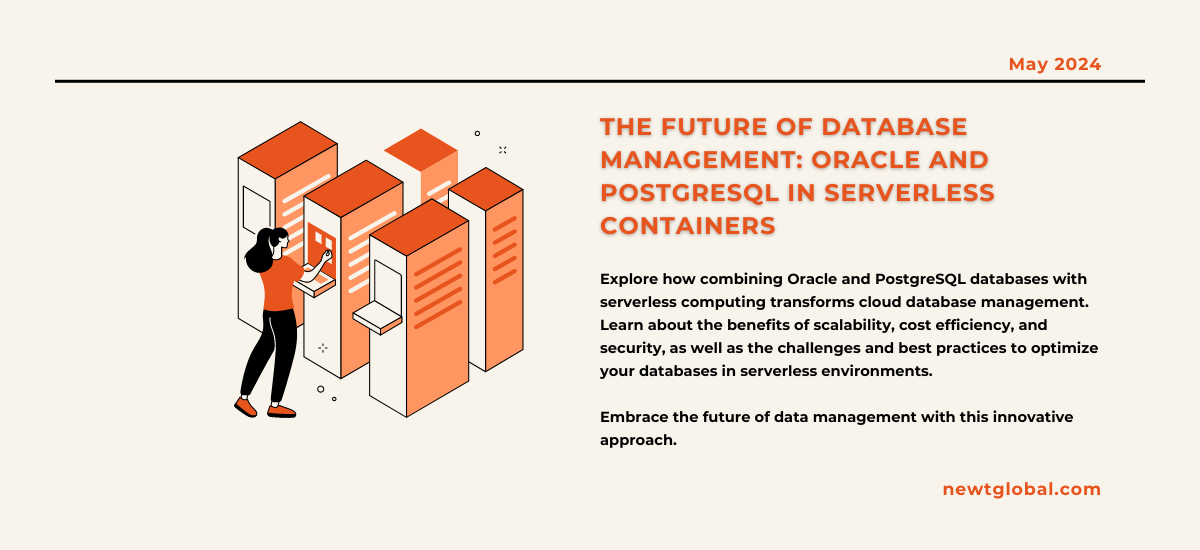
Bringing Oracle and PostgreSQL databases into the world of serverless computing is a big deal for cloud technology. This combination is a big step forward in how we use the cloud to run applications and services without having to manage a lot of the technical stuff ourselves. It’s particularly useful for working with databases, making it easier and more efficient to manage large amounts of data with Oracle and PostgreSQL. This approach mixes the best parts of traditional database systems with the flexibility and cost-effectiveness of the latest cloud technology. We’ll explore the benefits, the challenges, and some key things to think about.
Serverless Technology Explained
Serverless computing is a way of running applications in the cloud without having to worry about the servers themselves. For Oracle and PostgreSQL databases, this means they can run in “serverless containers.” These are special environments that automatically handle the technical stuff like adjusting resources when more or less computing power is needed, and billing you only for what you use. This makes databases more efficient and easier to scale without any extra work.
Why Oracle and PostgreSQL are Great for This
Around the world, Oracle and PostgreSQL are well-respected for their many features, reliability, and ability to handle complex data tasks. Oracle uses its own special system that’s known for its strong security, performance, and scalability. On the other hand, PostgreSQL is praised for being flexible, sticking to standards, and having a helpful community since it’s open-source. Using Oracle and PostgreSQL in serverless containers is a smart way to make use of these strong points in a more affordable, cloud-focused environment.
Oracle and PostgreSQL in Serverless Containers
-
- Scalability and Flexibility: The databases can automatically get the right amount of computing resources they need, which makes them very adaptable to changing demands.
- Cost Efficiency: The pricing plan is based on how much resources you use, which is different from the usual fixed-resource plans. This makes it a more cost-effective way to handle Oracle and PostgreSQL databases.
- Simpler Management: When you use a serverless model, you don’t have to worry about managing the infrastructure, like taking care of database servers. This lets teams concentrate on developing rather than handling operations. It makes managing Oracle and PostgreSQL databases easier in serverless containers.
- Better Security: Serverless platforms have strong security features that keep databases safe from hackers and cyber attacks. They work alongside Oracle and PostgreSQL, which also have advanced security, making sure databases stay secure in serverless setups.
Challenges to Keep in Mind
-
- Starting Delays: Sometimes, it can take a moment for the databases to get going, which might slow down applications that need to be really fast.
- Resource Limits: The serverless model might limit how much memory and computing power you can use, which could affect performance during heavy use.
- Sticking to One Provider: If you use serverless containers from a specific cloud provider, it might be hard to move to a different provider later on.
- Compatibility and Moving Databases: Making sure your current database setup works well with serverless containers can take some planning and testing.
Good Practices to Follow
-
- Performance Tuning: Making changes to Oracle and PostgreSQL database settings for serverless setups is crucial for dealing with slow starts and limits on resources.
- Security Steps: Using the built-in security features of both the serverless platform and the database is very important to keep data safe in Oracle and PostgreSQL databases.
- Monitoring and Logging: Setting up good systems to watch and record what’s happening in the database is really important. This helps us see how well the database is working and how it’s being used, which helps us spend money wisely and make things work better.
- Planning Migration: Moving databases to serverless containers in stages can help deal with compatibility issues.
Conclusion
Mixing Oracle and PostgreSQL databases with serverless containers brings together the best of traditional and modern cloud computing. By paying attention to the benefits and challenges and following good practices, organizations can make the most of their databases in a serverless environment. This approach leads to better scalability, cost savings, and simpler operations, marking a big step forward in cloud database management.
Discover the future of database management with our latest blog on Oracle and PostgreSQL in serverless containers! Learn how this fusion combines reliability with modern cloud scalability at Newt Global.
For more insights, visit newtglobal.com.
Reach out to us at marketing@newtglobalcorp.com. Plus, find out how Newt Global DMAP makes mass migration faster, better, and cheaper. Embrace innovation today!
